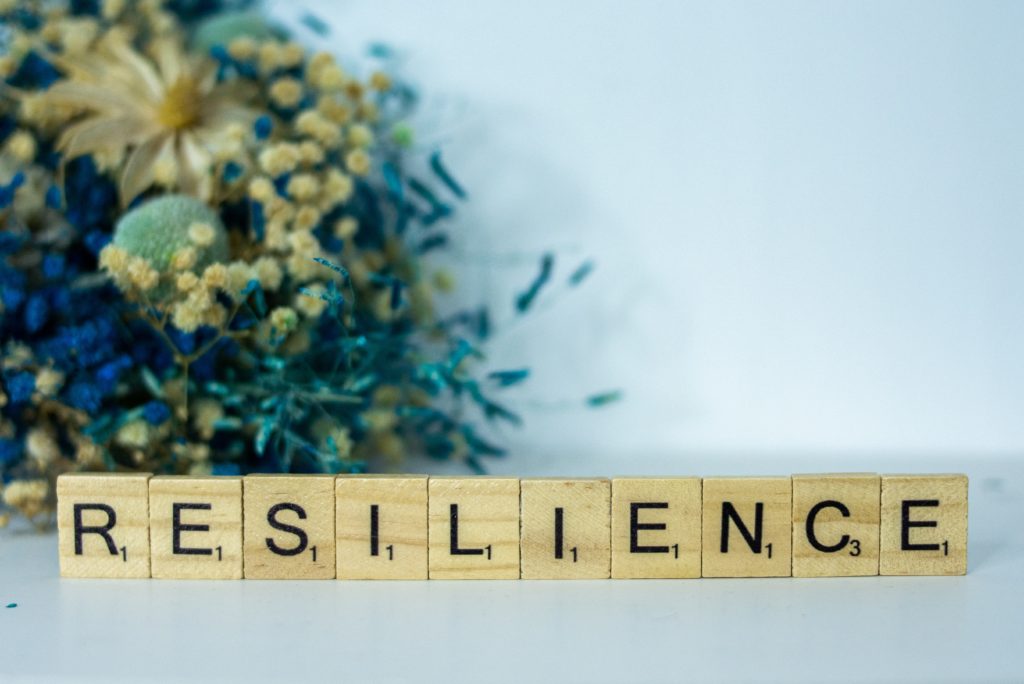Building Resilience – or developing your “bounce back ability”!
August has had me thinking about resilience and how we manage to bounce back after really tough times, dust ourselves off and carry on. This train of thought has been brought on by my daughter’s situation with her University. They let her down really badly, she had to make the incredibly hard decision to change her University for her second year onwards. I have seen her distraught, angry, sad, stressed out, panicked and worn out with the emotional roller coaster.
And yet she has coped with it all with an amazing amount of grace and managed to pick herself up and is preparing to start again at a different University – going back into Halls to create a new social group, joining a course where the others on it have been together for a year and getting to know a new city all over again. A tough ask for anyone, but I think at 20 years old it takes a great deal of maturity to handle all this!

So what is resilience?
The definition of resilience is “the capacity to recover quickly from difficulties; toughness” (Dictionary)
I have been reflecting on the components of resilience and how we can nurture resilience in ourselves and others. After all, this ability to adapt and recover, to pick up and have the self-belief to set off again, is one that we all need. During our lifetimes we all hit bumps, hills and mountains on our journey – and sometimes large pit holes that we fall into and from which we struggle to climb out. Whether it is major life events such a divorce or the death of a loved one; a failure that we find hard, such as not getting the exam results we wanted or the ideal job we applied for; a trauma or natural disaster, or anything else that grinds us down, stresses us out and makes life feel a bit like a battle, we all need resilience to get through life.
So often we have no control in what is happening in these situations, and that can make them seem even harder to deal with, but we have the ability to manage the way in which we respond. Resilience doesn’t make the situation go away, but it does allow us to continue to function physically and psychologically so we continue to move forward with our lives.
Developing our resilience empowers us, so that we are better able to:
- Meet the demands life places on us
- Handle challenges and setbacks
- Grow our self worth and increase our independence
- Develop a sense of purpose in life and have goals and dreams for the future
- Ask for help when we need it
So, how can you build up your own “bounce back ability”?
There are seven components that can help:
Maintain a healthy perspective – so often major events and stressors can cause you to slip into irrational thinking and “catastrophising” where events are blown up out of proportion. Being aware of this possibility and managing the thoughts when they occur so you can adopt a more balanced and realistic thought process is important. Remember, you choose your thoughts.
Think positively and be optimistic– rather than allowing yourself to wallow in a pit of self pity, or focus on all the things that are bad, you can try to focus on what you want to achieve and keep working towards this. The learning you get from the current challenging situation will help you with your ongoing journey so you can try to view it as an opportunity for personal growth. Believe that positive, good things will occur if you hang in there!
Take care of yourself – our ability to cope with difficult life events and stress is as much about our physical health as our mental. Trying to ensure you eat well, get enough sleep and take some exercise is important to both aspects of your health. Don’t turn to alcohol or other substances to cope. You can also try mindfulness activities such as meditation and yoga to help you cope. (You can get my free guide to trying a meditation practice for the first time here.)
Develop problem solving skills – if you can come up with a list of possible solutions, you will be better able to cope with change, challenges, and major events. You can jot down some quick ways to tackle aspects of your current situation and this gives you a focus for thoughts and action ana also provides you with goals to achieve.
Keep your overall dream in mind – as well as feeding into the positivity, making small steps towards that purpose can make you feel you are still achieving, energised and gives you something to focus on other than the more difficult event or situation.
Keep in contact with your support network, whether family, friends or colleagues – the old adage of a problem shared is a problem halved is often very true. Just talking over the situation can help you get a different perspective and feel more able to cope and bounce back. You can find groups that will support you online, in your locality or perhaps by joining a local class.
Find some help if you need it – getting support from a professional is a sign of strength – asking for help is not a weakness, but shows you have enough insight to know you need more support. Professionals can help you with more tools and tips to help you build up your resilience.
It takes time to build resilience, so don’t be discouraged if you find some life events difficult – keep working on your unique way to be resilient. There is no on specific approach that is right; instead it is a blend of your existing strengths and practising the components above that will make you better able to bounce back.
I hope you have enjoyed this blog post – sign up blow to my email list to be notified when the latest blog is available.


0 comments